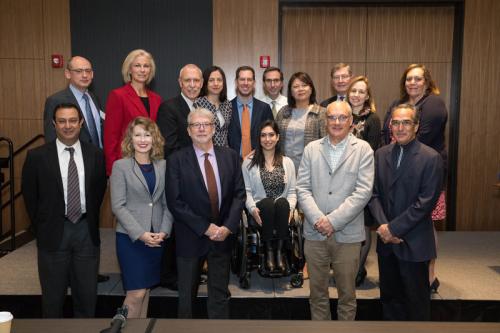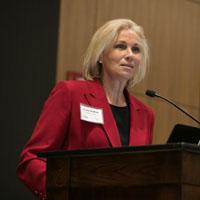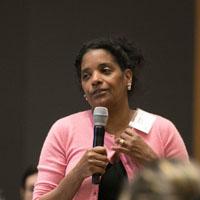
Alpha Stem Cell Clinics Symposium champions patients and research
More than 300 leading California clinical investigators, stem cell researchers, patient advocates, patients and the public gathered in a packed auditorium at UCLA on Thursday, April 19 for the 3rd annual symposium of the California Institute for Regenerative Medicine (CIRM) Alpha Stem Cell Clinics (ASCC) Network.
With a focus on the delivery of stem cell therapeutics to patients, the symposium highlighted advancements and accomplishments of the ASCC network and shared developments and applications in the field of stem cell therapeutics.
The ASCC Network was launched at five leading medical centers in 2015 to accelerate the delivery of high-quality stem cell-based therapeutics to patients in the form of FDA-regulated clinical trials for the treatment of challenging, incurable diseases.
Kicking off the event, Dr. John Adams, program director of the UCLA-UCI Alpha Stem Cell Clinic and professor and vice chair for research in the UCLA/Orthopaedic Hospital Department of Orthopaedic Surgery in the David Geffen School of Medicine at UCLA, shared the remarkable progress being made in the network’s 51 ongoing stem cell based clinical trials.
“Since the network’s inception in 2015, our portfolio of preclinical and clinical stem cell trials has increased 500 percent,” Adams said. “These include, just to name a few, novel therapeutic approaches to sickle cell disease, the cure for ADA-deficient severe combined immunodeficiency, also known as bubble baby disease, and the engineering of human immune cells to attack cancers and HIV.”

Patient advocate Gianna McMillan, co-founder of We Can Pediatric Brain Tumor Network, spoke in the morning session about her family’s experience navigating her son’s brain cancer diagnosis, his participation in a life-saving clinical trial, and her resulting advocacy work. She suggested creating a collaborative research partnership of patients and clinical investigators that would correct an imbalance of knowledge by helping patients and families speak the “language of the disease” and achieve the goals of true informed consent.
Speaker David Mitchell, a multiple myeloma patient and founder of Patients for Affordable Cures, spoke about the importance of scientific discovery and medical breakthroughs. He challenged the audience to consider, “What good is a therapy if no one can afford it?” Mitchell concluded his well-received talk with a call for political action that will lead to balanced drug pricing to benefit patients.
Clinical investigators from ASCC network sites City of Hope, UC San Diego, UC San Francisco, and the UCLA-UC Irvine clinic consortium shared their work to translate their research to the clinic in areas including cancer, immune deficiencies, stroke, traumatic brain injuries and spinal cord injuries.

At the close of the event, symposium attendee Adrienne Shapiro, a patient advocate for sickle cell disease research, commented that the event’s seamless inclusion of patient and patient advocate perspectives spoke volumes about the extent to which the ASCC network values and respects the individuals it serves.
CIRM spokesperson Kevin McCormack highlighted in the agency’s Stem Cellar blog, “It’s encouraging to see that just as the field of stem cell research is advancing so too is the prominence of the patient’s voice. The CIRM Alpha Stem Cell Clinics Network is pushing the field forward in exciting ways, and the patients are becoming an increasingly important and vital part of that.”